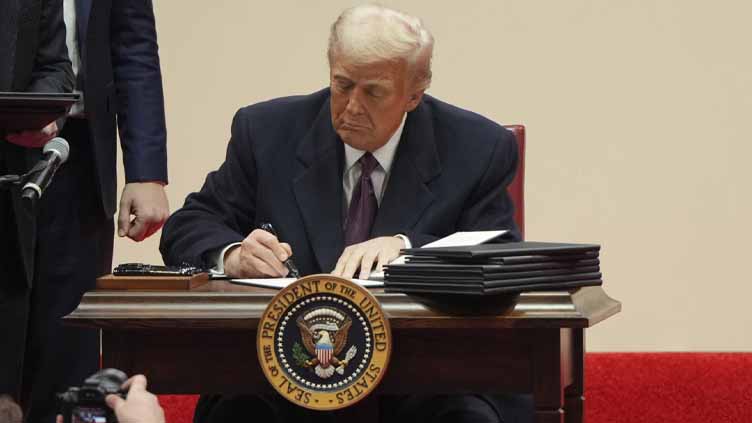Trump signs executive order directing US withdrawal from the Paris climate agreement — again

World
Trump also signed a letter to the United Nations indicating his intention to withdraw from the 2015
WASHINGTON (AP) — President Donald Trump signed an executive order Monday directing the United States to again withdraw from the landmark Paris climate agreement, dealing a blow to worldwide efforts to combat global warming and once again distancing the U.S. from its closest allies.
Trump’s action, hours after he was sworn in to a second term, echoed his directive in 2017, when he announced that the U.S. would abandon the global Paris accord. The pact is aimed at limiting long-term global warming to 2.7 degrees Fahrenheit (1.5 degrees Celsius) above pre-industrial levels or, failing that, keeping temperatures at least well below 3.6 degrees Fahrenheit (2 degrees Celsius) above pre-industrial levels.
Trump also signed a letter to the United Nations indicating his intention to withdraw from the 2015 agreement, which allows nations to provide targets to cut their own emissions of greenhouse gases from the burning of coal, oil and natural gas.
Those targets are supposed to become more stringent over time, with countries facing a February 2025 deadline for new individual plans. The outgoing Biden administration last month offered a plan to cut U.S. greenhouse gas emissions by more than 60% by 2035.
Trump’s order says the Paris accord is among a number of international agreements that don’t reflect U.S. values and “steer American taxpayer dollars to countries that do not require, or merit, financial assistance in the interests of the American people.”
Instead of joining a global agreement, “the United States’ successful track record of advancing both economic and environmental objectives should be a model for other countries,’' Trump said.
Laurence Tubiana, CEO of the European Climate Foundation and a key architect of the Paris accord, called the planned U.S. withdrawal unfortunate but said action to slow climate change “is stronger than any single country’s politics and policies.”
The global context for Trump’s action is “very different to 2017,’' Tubiana said Monday, adding that “there is unstoppable economic momentum behind the global transition, which the U.S has gained from and led but now risks forfeiting.”
The International Energy Agency expects the global market for key clean energy technologies to triple to more than $2 trillion by 2035, she said.
“The impacts of the climate crisis are also worsening. The terrible wildfires in Los Angeles are the latest reminder that Americans, like everyone else, are affected by worsening climate change,” Tubiana said.
Gina McCarthy, who served as White House climate adviser under President Joe Biden, a Democrat, said that if Trump, a Republican, “truly wants America to lead the global economy, become energy independent and create good-paying American jobs,” then he must “stay focused on growing our clean energy industry. Clean technologies are driving down energy costs for people all across our country.”
The world is now long-term 2.3 degrees Fahrenheit (1.3 degrees Celsius) above mid-1800s temperatures. Most but not all climate monitoring agencies said global temperatures last year passed the warming mark of 2.7 degrees Fahrenheit, and all said it was the warmest year on record.
The withdrawal process from the Paris accord takes one year. Trump’s previous withdrawal took effect the day after the 2020 presidential election, which he lost to Biden.
While the first Trump-led withdrawal from the landmark U.N. agreement — adopted by 196 nations — shocked and angered nations across the globe, “not a single country followed the U.S. out the door,” said Alden Meyer, a longtime climate negotiations analyst with the European think tank E3G.
Instead, other nations renewed their commitment to slowing climate change, along with investors, businesses, governors, mayors and others in the U.S., Meyer and other experts said.
Still, they lamented the loss of U.S. leadership in global efforts to slow climate change, even as the world is on track to set yet another record hot year and has been lurching from drought to hurricane to flood to wildfire.


